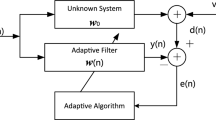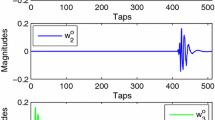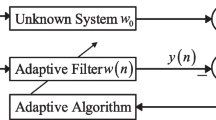Abstract
Partial update (PU) techniques efficiently reduce computational complexity, especially for long-tap applications such as echo cancelation problems. However, periodic signals are known to induce instability for many PU algorithms, but not the stochastic PU (SPU) algorithm. For a small enough step-size, the SPU algorithm guarantees stability. However, it suffers a slow convergence speed. This paper proposes a non-uniformly distributed SPU (NSPU) least-mean-square (LMS) algorithm, which updates the taps in a non-uniform fashion such that a bigger tap gains a higher updating probability. This can be accomplished by randomly combining a “data independent” (SPU) with a “data dependent” (maximum partial output) PU criteria. Our approach not only preserves the stability of the SPU LMS algorithm but also enhances the convergence speed with a lower hardware cost. Simulation results show that our NSPU LMS algorithm demonstrates significant improvements when only one-sixteenths of total taps are updated at each iteration.











Similar content being viewed by others
Notes
If \(N=512\), we need to allocate the memory size of about 512G bytes to a floating-point and double-precision matrix \(\mathbf G \)
The baseline means each group is chosen with equal probability. By the word “deemphasize”, we mean the number of counts within one group is below the baseline.
References
M.S.E. Abadi, J.H. Husøy, Mean-square performance of the family of adaptive filters with selective partial updates. Signal Process. 88(8), 2008–2018 (2008)
M.S.E. Abadi, F. Moradiani, A unified approach to tracking performance analysis of the selective partial update adaptive filter algorithms in nonstationary environment. Digit. Signal Process. A Rev. J. 23(13), 817–830 (2013)
T. Aboulnasr, K. Mayyas, Complexity reduction of the NLMS algorithm via selective coefficient update. IEEE Trans. Signal Process. 47(5), 1421–1424 (1999)
D.S. Chen, K.S. Chou, Y.W. Wang, A new block-based stochastic adaptive algorithm for sparse echo cancellation, in Proceedings of International Conference on Signal Processing Systems (ICSPS), vol. 1, pp. V1–756-V1-760, 2010.
Y.R. Chien, W.L. Mao, H.W. Tsao, Design of a robust multi-channel timing recovery system with imperfect channel state information for 10GBASE-T. IEEE Trans. Circuits Syst. I Regul. Pap. 57(4), 886–896 (2010). doi:10.1109/TCSI.2009.2028595.
G. Deng, Partial update and sparse adaptive filters. IET Signal Process. 1(1), 9–17 (2007)
H. Deng, M. Doroslovacki, New sparse adaptive algorithms using partial update, in Proceedings of International Conference on Acoustics, Speech, and Signal Processing (ICASPP), pp. 845–848, 2004.
K. Doğançay, Partial-Update Adaptive Signal Processing: Design Analysis and Implementation (Academic Press, New York, 2008)
K. Doğançay, Averaging analysis of partial-update adaptive filters, in Proceedings of IEEE Region 10 Conference TECON, pp. 1–6, 2009.
K. Doğançay, O. Tanrikulu, Adaptive filtering algorithms with selective partial updates. IEEE Trans. Circuits Syst. II 48(8), 762–769 (2001)
S.C. Douglas, Adaptive filters employing partial updates. IEEE Trans. Circuits Syst. I I(44), 209–216 (1997)
D.L. Duttweiler, Proportionate normalized least-mean-squares adaptation in echo cancelers. IEEE Trans. Speech Audio Process. 8(5), 508–518 (2000)
A. Enteshari, J. Fadlullah, M. Kavehrad, Joint channel and echo impulse response shortening for high-speed data transmission. IEEE Syst. J. 3(3), 270–276 (2009)
M. Godavarti, A. Hero, Partial update LMS algorithms. IEEE Trans. Signal Process. 53(7), 2382–2399 (2005)
S.O. Haykin, Adaptive Filter Theory (Prentice Hall, Upper Saddle River, 2001)
ITU: ITU-T G.168, Digital Network Echo Cancellers (ITU, Geneva, 2009).
R. Mei, IEEE 802.3an 10GBASE-T Study Group (2006), http://www.ieee802.org/3/an/public/material/index.html. Accessed 1 Feb 2013
R. Nath, Adaptive echo cancellation based on a multipath model of acoustic channel. Circuits Syst. Signal Process. 2012, 1–26 (2012). doi:10.1007/s00034-012-9529-4
I. Pitas, Fast algorithms for running ordering and max/min calculation. IEEE Trans. Circuits Syst. 36(6), 795–804 (1989)
S. Werner, L.R. de Campos, P.S.R. Diniz, Partial-update NLMS algorithms with data-selective updating. IEEE Trans. Signal Process. 52(4), 938–949 (2004)
J. Yang, X. Zhu, G. Sobelman, K.K. Parhi, Sparseness-controlled adaptive tap algorithms for partial update adaptive filters, in Proceedings of International Conference on Information, Communications and Signal Processing (ICICS), pp. 1–5, 2009.
Acknowledgments
This work was supported in part by the National Science Council, R.O.C., under Grant 101-2218-E-197-001.
Author information
Authors and Affiliations
Corresponding author
Rights and permissions
About this article
Cite this article
Chien, YR., Chu, SI. A Fast Converging Partial Update LMS Algorithm with Random Combining Strategy. Circuits Syst Signal Process 33, 1883–1898 (2014). https://doi.org/10.1007/s00034-013-9724-y
Received:
Revised:
Published:
Issue Date:
DOI: https://doi.org/10.1007/s00034-013-9724-y




